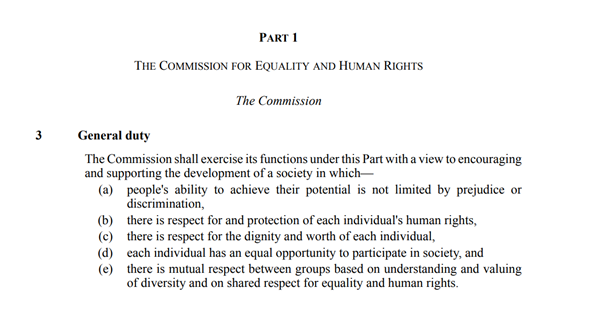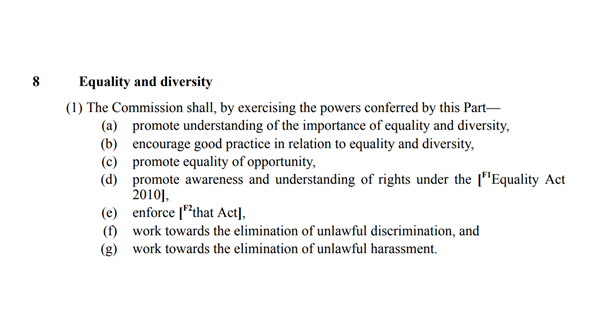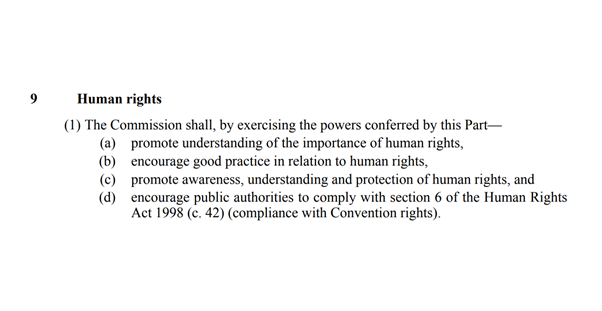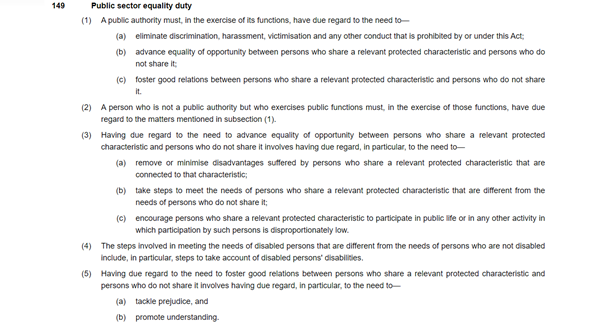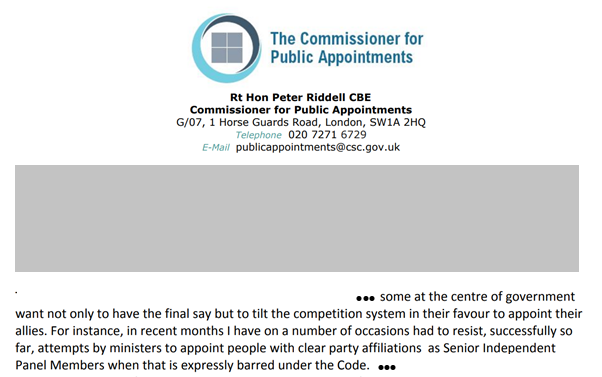Building on @cjayanetti’s article about Jessica Butcher’s recent appointment to the Equality and Human Rights Commission, there are additional concerns about the appointment process for all of the recent vacancies—which I examine in this thread. https://www.theguardian.com/society/2020/nov/22/new-equalities-commissioner-attacked-modern-feminism-and-metoo">https://www.theguardian.com/society/2...
I elaborate on these concerns in ‘Concerns about Exclusionary Eligibility Criteria for Recent Vacancies on the Equality and Human Rights Commission’: http://dermotfeenan.com/index.php/2020/11/23/concerns-about-exclusionary-eligibility-criteria-for-recent-vacancies-on-the-equality-and-human-rights-commission/.">https://dermotfeenan.com/index.php... They build on my experience as an Independent Assessor for public appointments in Northern Ireland.
I defer consideration of the possible grounds for legally challenging any of the appointments, though it is clear that appointments to public bodies are subject to judicial review (see, for example, Downes, Re Application for Judicial Review [2006] NIQB 77).
The appointment of Jessica Butcher was one of four recently made to the Equality and Human Rights Commission (EHRC)( @EHRC). The process for appointment started with the public launch of the appointments competition on 29 June 2020.
My principal concern is with the government’s decision to substantially narrow eligibility for appointments to favour persons from a private sector and/ or business background/ perspective. This significantly limits the pool of suitable candidates.
Appointments of Commissioners to the EHRC are regulated by the Commissioner for Public Appointments currently Peter Riddell ( @_peterriddell) and subject to the Governance Code, which sets out the principles that should underpin all public appointments.
The Commissioner’s legislated functions are set out in the Public Appointments Order in Council 2016. The Commissioner’s primary role is to provide independent assurance that public appointments are made in accordance with the Code and Principles of Public Appointments.
The Principles comprise ministerial responsibility, three of the seven principles of public life (selflessness, integrity, openness), and merit, diversity, fairness and assurance (that there are processes with appropriate checks and balances).
The minister responsible for the public body has ultimate responsibility for the appointment, though the department is responsible for running the process, including completion of the person specification and eligibility criteria—included in a candidate information pack.
The first essential criterion: ‘Senior level leadership experience and the ability to work collaboratively and chair at Board level, including the ability to bring a business perspective and practical mind-set to discussions and the credibility to effectively challenge others.’
The Candidate Information Pack for these vacancies included a message from the minister, Liz Truss, Minister for Women and Equalities, which included the following statement: ‘We seek candidates with a business perspective’.
The Cabinet Office is the department responsible for managing appointments to the Equality and Human Rights Commission. It added: ‘We particularly welcome applications from those currently working in, or with experience of, the private sector’.
This language would tend to exclude, or at least discourage, those from the public sector, third sector, international NGOs, and unions.
Many organisations set up to address equality, discrimination and human rights are in the third sector.
Many organisations set up to address equality, discrimination and human rights are in the third sector.
Many people researching, writing and teaching on these matters work in the public sector, including in universities and statutory organisations—with a significant number also serving on boards of charities.
The Candidate Information Pack would likely have inhibited eminently qualified candidates with the required experience, knowledge, or other suitability, such as those who occupy positions in the equality and human rights commissions elsewhere in the United Kingdom.
The Chief Commissioner of the Northern Ireland Human Rights Commission (NIHRC) is Les Allamby. He is a solicitor and former Director of the Law Centre (NI). He chaired the Advisory Group to NIHRC on proposals for economic and social rights within a bill of rights for NI.
He also chaired the Commonwealth Forum for National Human Rights Institutions; Social Security Standards Committee for Northern Ireland, and; the immigration sub-group at the Office of the First Minister and Deputy First Minister in Northern Ireland.
Les Allamby would not have been the type of candidate encouraged by the current UK government to apply to the Equality and Human Rights Commission in England and Wales. The same might be said of the Chair of the Scottish Human Rights Commission, Judith Robertson.
She is the former Programme Director of See Me – Scotland’s programme to tackle mental health stigma and discrimination. She is also former Chair of the Scottish Refugee Council and former Head of Oxfam Scotland.
The Equality Act 2006 provides that the Secretary of State shall appoint not less than 10 or more than 15 Commissioners, and must appoint only if he/ she thinks that the individual
(i) has experience or knowledge relating to a relevant matter, or
(i) has experience or knowledge relating to a relevant matter, or
(ii) is suitable for appointment for some other special reason, and
have regard to the desirability of the Commissioners together having experience and knowledge relating to the relevant matters: discrimination (whether on grounds including gender and race) and human rights.
have regard to the desirability of the Commissioners together having experience and knowledge relating to the relevant matters: discrimination (whether on grounds including gender and race) and human rights.
Clearly, the first 2 criteria are broad. They don& #39;t specify the degree of experience or knowledge relating to a relevant matter. The final criterion is so broad as to allow for appointment because the candidate is ‘suitable’ for ‘some other special reason’ unspecified in the Act.
The criteria recognise that there may be variation in experience, knowledge or other suitability between Commissioners, reflected in the reference to ‘the Commissioners together’. Some Commissioners may have distinctive strengths in one or more criterion.
The final requirement’s reference to the ‘desirability that the Commissioners together having experience and knowledge relating to the relevant matters’ reinforces the primary criterion – to show ‘experience or knowledge relating to a relevant matter’.
Any competition for appointment of a Commissioner to the EHRC should make this clear. Some Commissioners may have backgrounds at executive or non-executive board level in national plcs. Some may be senior practising lawyers. Some may be directors of charitable organisations.
Some might be professors who have researched and written in the field. Some may combine one or more occupations. Such a range and blend of experience and knowledge, and perhaps suitability for some other special reason, enriches and strengthens board-level decision-making.
That decision-making is significant. Commissioners’ powers are set out in the Equality Act 2006. They include power to appoint a chief executive and other staff. They may appoint one or more Investigating Commissioners to, for instance, carry out an inquiry or an investigation.
The Governance Code, which has some legal status, states: ‘Public appointments processes should be designed to ensure that the best people, from the widest possible pool of candidates, are appointed to these roles.’
When the competition was launched, there were 10 Commissioners. David Isaac, then Chair of the Commission, left in August 2020, leaving 9 Commissioners. The biographies of the current 9 Commissioners are set out here: https://www.equalityhumanrights.com/en/yr-hyn-ydym-ni/our-Commissioners-committees-and-governance/about-our-Commissioners">https://www.equalityhumanrights.com/en/yr-hyn...
None of the Commissioners is an academic. Only one has significant experience primarily in the public sector. A very small minority have some third sector experience. The preponderance of occupational background among the Commissioners is in the private sector and business.
The narrow eligibility criteria in the latest appointment process effectively exclude anyone other than those from the private sector or with business backgrounds/ perspectives. This adversely affects the ability of the EHRC to fulfil a number of its statutory duties and powers.
The EHRC has a number of duties, including a general duty to exercise its functions with a view to encouraging and supporting the development of a society in which, among other things, people’s ability to achieve their potential is not limited by prejudice or discrimination.
The EHRC also has specific duties regarding equality and diversity. It shall, amongst other things, promote understanding of the importance of equality and diversity, and encourage good practice in relation to equality and diversity.
The EHRC has specific duties regarding human rights. It shall, amongst other things, promote understanding of the importance of human rights, and promote awareness, understanding and protection of human rights.
Under section 149, Equality Act 2010, specific duties are placed on public authorities, including local government and a wide range of bodies with public functions such as the Metropolitan Police Commissioner, Health and Safety Executive, and Nursing and Midwifery Council.
These duties are, broadly, to have due regard to the need to eliminate discrimination, harassment, and victimisation, advance equality of opportunity, and foster good relations under this Act.
Thousands of public authorities across the country undertake cumulatively a huge range of responsibilities, with a total spend amounting to billions of pounds each year. These authorities are often subject to distinctive laws and policies compared to the private/ business sector.
The ability of the Commission to meet its general and specific duties in the Equality Act 2006 and its duties under the Equality Act 2010 is reliant on its Commissioners’ experience, knowledge or suitability for some other special reason.
It is of concern therefore that the latest appointment process for the EHRC leaves the Commission with such low representation from sectors where distinctive experience, knowledge or other suitability is necessary to enable the Commission to meet its general and specific duties.
This concern is exacerbated by the inclusion in the process of criteria which appear to be at odds with the requirement in the Governance Code that the process be designed to ensure that the best people, from the widest possible pool of candidates, are appointed to these roles.
In October 2020, the Commissioner for Public Appointments published a letter to Lord Evans, Chair of the Committee on Standards in Public Life ( @PublicStandards), which included some concerns about recent public appointments: https://assets.publishing.service.gov.uk/government/uploads/system/uploads/attachment_data/file/932513/Peter_Riddell_to_Lord_Evans.docx.pdf.">https://assets.publishing.service.gov.uk/governmen...
The Commissioner’s concerns included ‘that some at the centre of government want not only to have the final say but to tilt the competition system in favour of their allies’ (below, edited). He also noted the growth in unregulated appointments.
Mr Riddell concluded that these developments ‘may reduce diversity of thought and experience rather than increase it’ and discourage ‘experienced and talented people of all backgrounds from applying’ to organisations which supply services to the public.
It seems difficult in view of the foregoing to justify narrow criteria favouring those with a private sector/ business background for appointment to the EHRC, especially given the number of vacancies, existing composition of the Commission, and duties of the Commission
There is some evidence that the current government’s privileging of the private sector/ business is part of its broader ideological commitments to reducing reliance on public services, increasing privatisation, de-regulating, and promoting free trade.
The Minister in charge of the recent appointments to the EHRC, Liz Truss, was one of the authors of Britannia Unchained: Global Lessons for Growth and Prosperity, a book advocating that Britain needs free-market economics, with fewer employment laws.
The authors also argued that the UK should “stop indulging in irrelevant debates about […] women and men.” Such ideological commitments must not compromise the government’s responsibility to adhere to law governing public appointments.
This thread setting out concerns about the application process for recent appointments to the EHRC is copied for information to the following:
@JolyonMaugham
@gem_abbott
@AdamWagner1
@CommonsPACAC
@JolyonMaugham
@gem_abbott
@AdamWagner1
@CommonsPACAC

 Read on Twitter
Read on Twitter